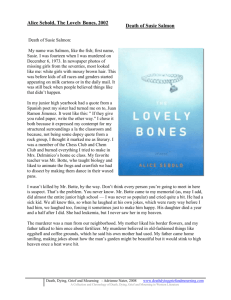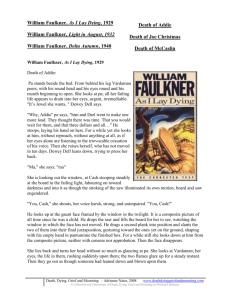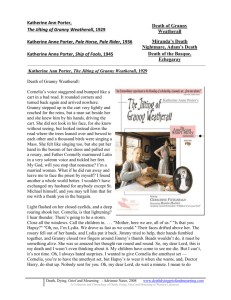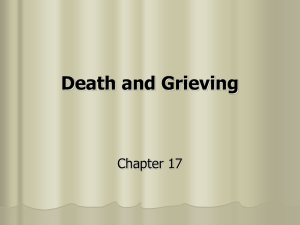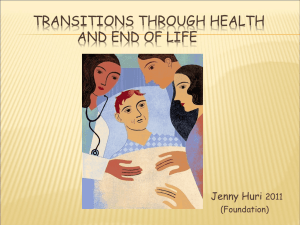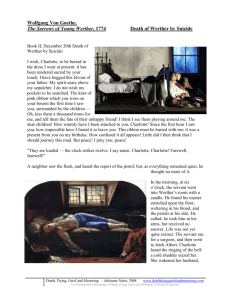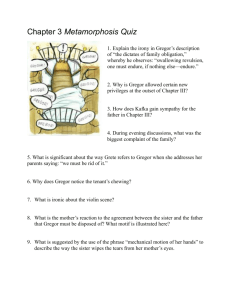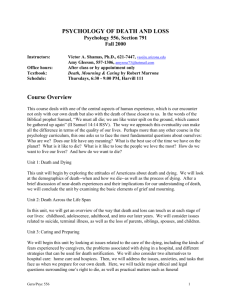Printable Page - Death, Dying, Grief and Mourning in Western
advertisement
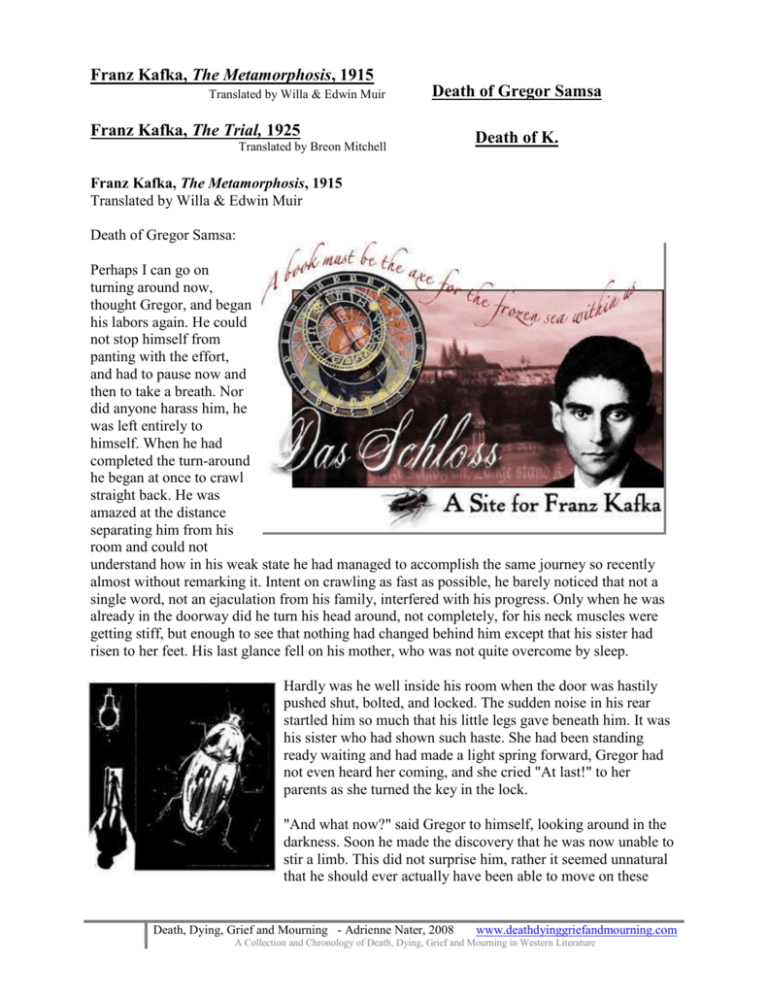
Franz Kafka, The Metamorphosis, 1915 Translated by Willa & Edwin Muir Death of Gregor Samsa Franz Kafka, The Trial, 1925 Translated by Breon Mitchell Death of K. Franz Kafka, The Metamorphosis, 1915 Translated by Willa & Edwin Muir Death of Gregor Samsa: Perhaps I can go on turning around now, thought Gregor, and began his labors again. He could not stop himself from panting with the effort, and had to pause now and then to take a breath. Nor did anyone harass him, he was left entirely to himself. When he had completed the turn-around he began at once to crawl straight back. He was amazed at the distance separating him from his room and could not understand how in his weak state he had managed to accomplish the same journey so recently almost without remarking it. Intent on crawling as fast as possible, he barely noticed that not a single word, not an ejaculation from his family, interfered with his progress. Only when he was already in the doorway did he turn his head around, not completely, for his neck muscles were getting stiff, but enough to see that nothing had changed behind him except that his sister had risen to her feet. His last glance fell on his mother, who was not quite overcome by sleep. Hardly was he well inside his room when the door was hastily pushed shut, bolted, and locked. The sudden noise in his rear startled him so much that his little legs gave beneath him. It was his sister who had shown such haste. She had been standing ready waiting and had made a light spring forward, Gregor had not even heard her coming, and she cried "At last!" to her parents as she turned the key in the lock. "And what now?" said Gregor to himself, looking around in the darkness. Soon he made the discovery that he was now unable to stir a limb. This did not surprise him, rather it seemed unnatural that he should ever actually have been able to move on these Death, Dying, Grief and Mourning - Adrienne Nater, 2008 www.deathdyinggriefandmourning.com A Collection and Chronology of Death, Dying, Grief and Mourning in Western Literature feeble little legs. Otherwise he felt relatively comfortable. True, his whole body was aching, but it seemed that the pain was gradually growing less and would finally pass away. The rotting apple in his back and the inflamed area around it, all covered with soft dust, already hardly troubled him. He thought of his family with tenderness and love. The decision that he must disappear was one that he held to even more strongly than his sister, if that were possible. In this state of vacant and peaceful meditation he remained until the tower clock struck three in the morning. The first broadening of light in the world outside the window entered his consciousness once more. Then his head sank to floor of its own accord and from his nostrils came the last faint flicker of his breath. When the charwoman arrived early in the morning — what between her strength and her impatience she slammed all the doors loudly, never mind how often she had been begged not to do so, that no one in the whole apartment could enjoy any sleep after her arrival—she noticed nothing unusual as she took her customary peep into Gregor’s room. She thought he was lying motionless on purpose, pretending to be in the sulks; she credited him with every kind of intelligence. Since she happened to have the long-handled broom in her hand she tried to tickle him up from the doorway. When that too produced no reaction she felt provoked and poked at him a little harder, and only when she had pushed him along the floor without meeting any resistance was her attention aroused. It did not take her long to establish the truth of the matter, and her eyes widened, she let out a whistle, yet did not waste much time over it but tore open the door of the Samsas’ bedroom and yelled into the darkness at the top of her voice:" Just look at this, it’s dead; it’s lying here dead and done for!" Death, Dying, Grief and Mourning - Adrienne Nater, 2008 www.deathdyinggriefandmourning.com A Collection and Chronology of Death, Dying, Grief and Mourning in Western Literature Franz Kafka, The Trial, 1925 Translated by Breon Mitchell Death of K.: After a brief polite exchange about who was responsible for the first of the tasks to come — the men seemed to have received their assignment without any specific division of labor — one of them went to K. and removed his jacket, his vest, and finally his shirt. K. shivered involuntarily, whereupon the man gave him a gentle, reassuring pat on the back. Then he folded the clothes carefully, as if they would be needed again, though not in the immediate future. In order not to leave K. standing motionless, exposed to the rather chilly night air, he took him by the arm and walked back and forth with him a little, while the other man searched for some suitable spot in the quarry. When he had found it, he waved, and the other gentleman led K. over to it. It was near the quarry wall, where a loose block of stone was lying. The men sat K. down on the ground, propped him against the stone, and laid his head down on it. In spite of all their efforts, and in spite of the cooperation K. gave them, his posture was still quite forced and implausible. So one of the men asked the other to let him work on positioning K. on his own for a while, but that didn’t improve things either. Finally they left K. in a position that wasn’t even the best of those they had already tried. Then one man opened his frock coat and, from a sheath on a belt that encircled his vest, drew forth a long, thin, double-edged butcher knife, held it up, and tested its sharpness in the light. Once more the nauseating courtesies began, one of them passed the knife across K. to the other, who passed it back over K. K. knew clearly now that it was his duty to seize the knife as it floated from hand to hand above him and plunge it into himself. But he didn’t do so; instead he twisted his still-free neck and looked above him. He could not rise entirely to the occasion, he could not relieve the authorities of all their work; the responsibility for this final failure lay with whoever had denied him the remnant of strength to do so. His gaze fell upon the top story of the building adjoining the quarry. Like a light flicking on, the casements of a window flew open, a human figure, faint and insubstantial Death, Dying, Grief and Mourning - Adrienne Nater, 2008 www.deathdyinggriefandmourning.com A Collection and Chronology of Death, Dying, Grief and Mourning in Western Literature at that distance and height, leaned far out abruptly, and stretched both arms out even further. Who was it? A friend? A good person? Someone who cared? Someone who wanted to help? Was it just one person? Was it everyone? Was there still help? Were there objections that had been forgotten? Of course there were. Logic is no doubt unshakable, but it can’t withstand a person who wants to live. Where was the judge he’d never seen? Where was the high court he’s never reached? He raised his hands and spread out all his fingers. But the hands of one man were right at K.’s throat, while the other thrust the knife into his heart and turned it there twice. With failing sight K. saw how the men drew near his face, leaning cheek-to-cheek to observe the verdict. "Like a dog!" he said; it seemed as though the shame was to outlive him. Death, Dying, Grief and Mourning - Adrienne Nater, 2008 www.deathdyinggriefandmourning.com A Collection and Chronology of Death, Dying, Grief and Mourning in Western Literature
